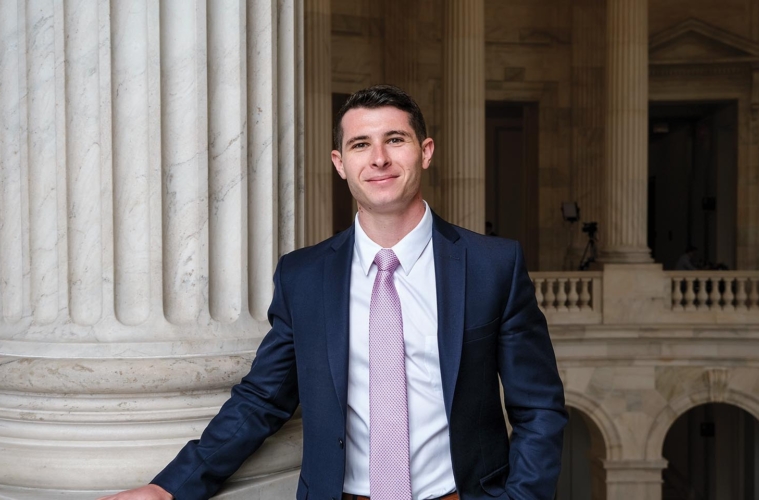Eli Cousin ’20 is press secretary for U.S. Sen. Jon Tester (D-Montana).
When Eli Cousin ’20 first started a new role as press secretary for U.S. Sen. Jon Tester (D-Montana), he got a crash course in just how hyperlocal politics can be in a rural state like Montana. After drafting a careful memo to prepare the senator for a local radio interview, he listened in as his new boss spoke with the show’s hosts — who promptly forced him to violate the first rule of communications: Don’t make the story about yourself.
“They saw my last name was Cousin, and they jokingly said to the senator, ‘Oh, we see you’ve hired your cousin,’” he says. “For the next 10 minutes, these radio guys were talking about me and my last name, and the memo and all the interview topics we’d discussed just sort of went out the window.” Beyond the humorousness of the situation, it underscored an important truism, says Cousin: All politics are local. Despite being the fourth-largest state in the country, Montana still feels like a small community, he says. “It’s a huge state geographically, but it’s also tight-knit to the point where the local radio guys know the senator so well that they’ll crack jokes about anything and everything — including his new press secretary’s name.”
The ability to navigate that hyperlocal landscape has been the key to Tester’s success. In an age of ferocious partisanship in politics, Tester is an anomaly: a Democratic senator in a predominantly Republican state. He has thrived due to his down-to-earth and personable presence, as a third-generation farmer with a flat-top buzzcut and three fingers missing from an accident with a meat grinder. When the local radio hosts do turn to interview the senator, their most pressing questions usually aren’t about his opinion of national politics or the president. “They want to know how his crops are looking, and about his classic cars, and what’s happening in their communities,” Cousin says. “That’s the kind of intimacy that voters in the state expect, and that’s what the senator brings.”
A personal connection to our political leaders was what first got Cousin interested in politics, when his AP U.S. Government class from Mamaroneck, N.Y., took a field trip to New Hampshire for the 2016 presidential primary election. “I got to see Sec. [Hilary] Clinton and Sen. [Bernie] Sanders up close, and shake hands and talk with Sen. Cory Booker,” he remembers. “There’s a sense of excitement when you can shake hands and hear directly from the candidates.”
At Colgate, he promptly threw himself into a class on the American presidency ahead of the 2016 election taught by political science professor Tim Byrnes. Cousin went on to serve in student government as three-time speaker of the Colgate Student Senate — helping institute a new level of transparency by broadcasting meetings online. He also wrote a political column for the Maroon-News and gave information sessions as a senior fellow in the admission office. The combination prepared him well for a career in political communications. “Talking with prospective students about why they might want to come to Colgate is in some ways a good warm-up for messaging and talking with prospective voters,” he notes. “You are trying to persuade an audience.”
He cut his teeth during summer internships with New York Sen. Chuck Schumer and in Pete Buttigieg’s 2020 presidential campaign. After Colgate, he worked on other campaigns before assuming the role of deputy national press secretary for the Democratic Senatorial Campaign Committee during the hard-fought 2022 midterm elections. There, he helped execute messaging for key senate races across the country, such as for Mark Kelly in Arizona and Raphael Warnock in Georgia. “As a former astronaut and fighter pilot, and a pastor who preached from Martin Luther King Jr.’s pulpit [respectively], those senators have unique personal brands,” says Cousin. “Senator Tester — as a third-generation Montana farmer — has a similarly strong brand that voters are drawn to.” One of Cousin’s strengths as a press secretary is his attention to detail. Before meeting Tester the first time, he Googled which hand the Senator had lost his fingers on, so he could be prepared for the handshake. (It was his left.) Since then, he’s thrown himself into studying Tester’s biography and has traveled in the state to connect with local reporters and understand Montana’s unique issues, proud that he has been able to channel Tester’s voice, including for a major speech for an annual Montana dinner event within weeks of starting the job.
Cousin says it’s Tester’s workmanlike ability to get things done in the senate that has endeared him to constituents across the political spectrum. One of his signature pieces of legislation is a bipartisan law signed last year to provide health care benefits to veterans exposed to toxic chemicals in the battlefield — particularly important to Montana, where 1 out of every 10 residents is a veteran (one of the highest per-capita rates in the country).
“For me to be able to chat directly with the senator, experience something larger than myself so directly, and to even have a very small role in hopefully affecting the country in a positive way,” Cousin says, “is very rewarding.”

